SURVEY: How Has the Coronavirus Impacted Moving Companies?
Posted in: Moving Stories, RegulationsThere is nothing that is not being disrupted in some way, shape, or form in the wake of the Coronavirus pandemic spreading across North America.
Among those disruptions, one of the most curious dynamics to keep an eye on is the obligation Americans still have for relocating… along with their willingness to hire people to move them.
As more and more people across the US are being urged to stay at home, movers have still been deemed an essential service by the government in many places.
But here’s the problem with “staying at home”: for many people, home is not a home, but a rental. The Pew Research Center suggests that more people are currently renting in America (over 43 million people) than at any other point in over 50 years.
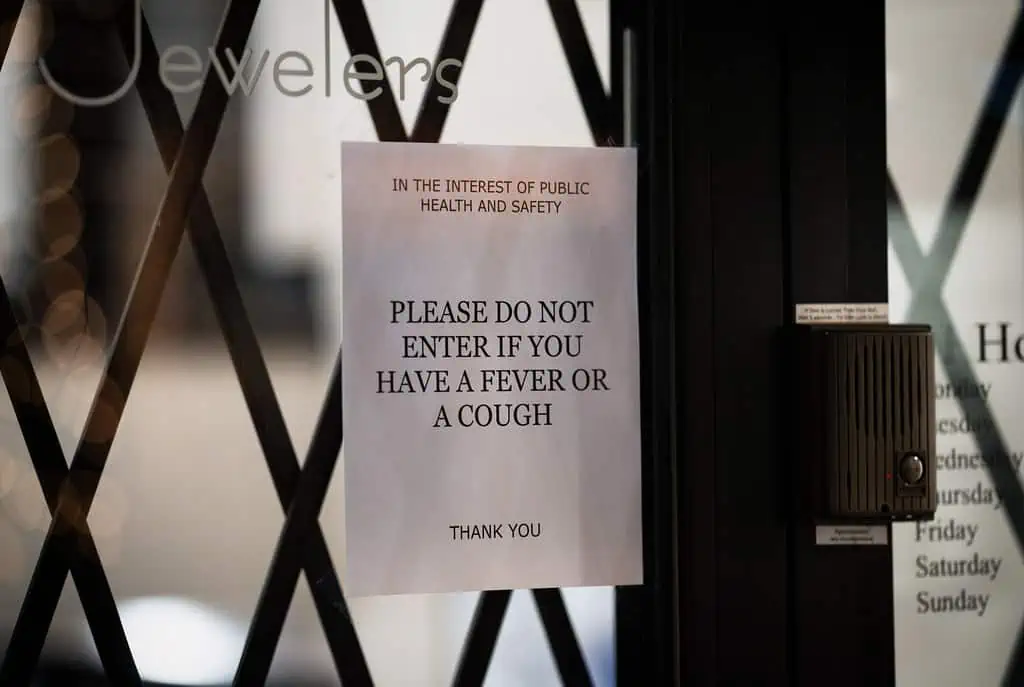
According to government census data, renters made up a whopping 67% of all moves in 2019. In a survey of renters by HireAHelper, an astonishing 97% of respondents had moved once in the last 5 years, which falls in line with their comprehensive 2020 migration study that found renters were four times more likely to move than homeowners.
And of course, homeowners add to the musical chairs too. They’re included in the roughly 31.4 million people who moved last year, as was reported by the government.
There’s no way around it: a lot of people across the country still have to move during the pandemic. This is especially true given the way economics have shifted younger generations away from homeownership, on top of the slowed reaction by the majority of states and the federal government to halt evictions, cease rent collection, and/or a multitude of other preventative safety measures.
Knowing the risks involved, are people actually going through with moving? And if they are, are they comfortable employing movers to help?
We asked hundreds of local moving companies across the country how they’ve been dealing with several unseen consequences of the virus.
Local moving companies are being majorly impacted by Coronavirus
A strong majority of movers, almost three-fourths in fact, have reported a decrease in business since the COVID-19 pandemic began.
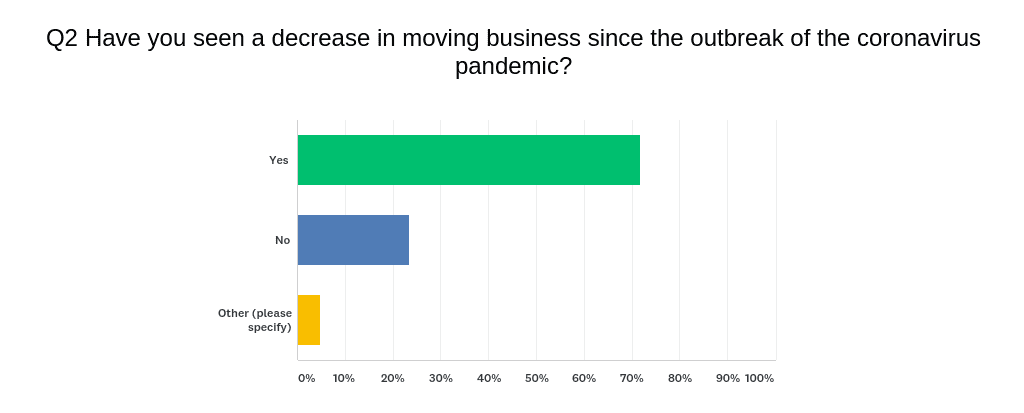
Have you seen a decrease in moving business since the outbreak of the Coronavirus pandemic?
- Yes – 71.69% (238)
- No – 23.49% (78)
- Other – 4.82% (16)
“I am afraid after yesterday’s job cancellation we may lose our business after all these years,” tells us a mover from Massachusetts. “This is normally our busiest season. This week we are down 65% business from last year and I would be devastated if we’re shut down for 14 days. This is really scary.”
The worry of local moving companies reflects the same uncertainty of local businesses everywhere. This, in spite of the fact that moving labor is a borderline utility, especially within the population who cannot move themselves and which happens to be the most vulnerable to the virus: the elderly.
“(My business is) mainly customers in retirement communities,” tells us one affected moving company from New York. “We have had an increase of (elderly) who are calling to confirm (if) we are still open.”
Moving companies are among the most essential services, and yet among the most at-risk businesses because of this dynamic.
Cancellations
The total number of cancellations moving companies are reporting vary, but the vast majority, 74.4%, report at least some job cancellations due to COVID-19.
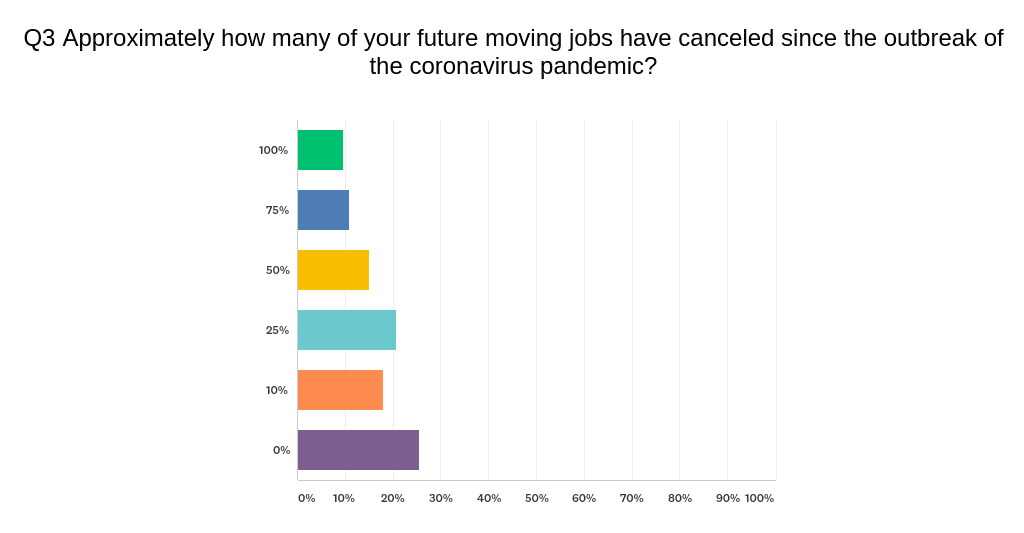
Approximately how many of your future moving jobs have canceled since the outbreak of the coronavirus pandemic?
- 100% cancellation – 9.64% (32)
- 75% cancellation – 10.84% (36)
- 50% cancellation – 15.06% (50)
- 25% cancellation – 20.78% (69)
- 10% cancellation – 18.07% (60)
- 0% cancellation – 25.6% (85)
Roughly a quarter of local movers are reporting no job cancellations, while around a third of movers are reporting between 25-50% job cancellation. Already, 10% have said a complete 100% of their jobs are currently cancelled.
And while the severity of overall concern ranges (“Still smooth sailing,” told us one mover in Texas), the vast majority of moving companies also report at least some concern about the sustainability of their business during a pandemic.
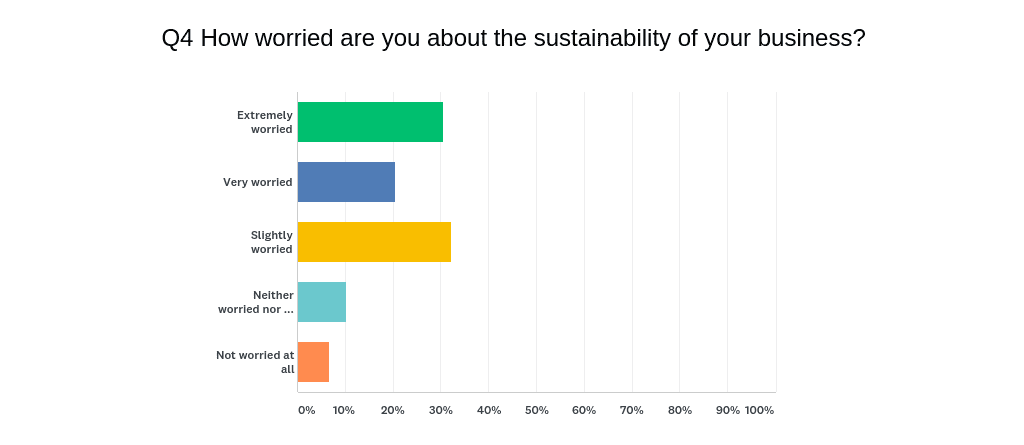
How worried are you about the sustainability of your business?
- Extremely worried – 30.63% (102)
- Very worried – 20.42% (68)
- Slightly worried – 32.13% (107)
- Neither worried no not worried – 10.21% (34)
- Not worried at all – 6.61% (22)
While about half of moving companies expressed strong concerns, a sizable portion of movers, about 42%, remain in the middle in terms of their overall concerns, despite the cancellations. “I believe there will be a rebound,” one moving company from Michigan told us.
Movers are finding it tough to deal with (and pay for) virus safety
The Centers for Disease Control and Prevention (CDC) recommends at least six feet of distance in between humans at all times, as the virus is passed on through human contact. People need to be washing their hands relentlessly. Major cities and states have shut down non-essential businesses.
These are virtually unprecedented safety measures during modern times. And movers are reporting it tough to deal with this all, given the nature of their job: going into a relative stranger’s home and, well, touching things.
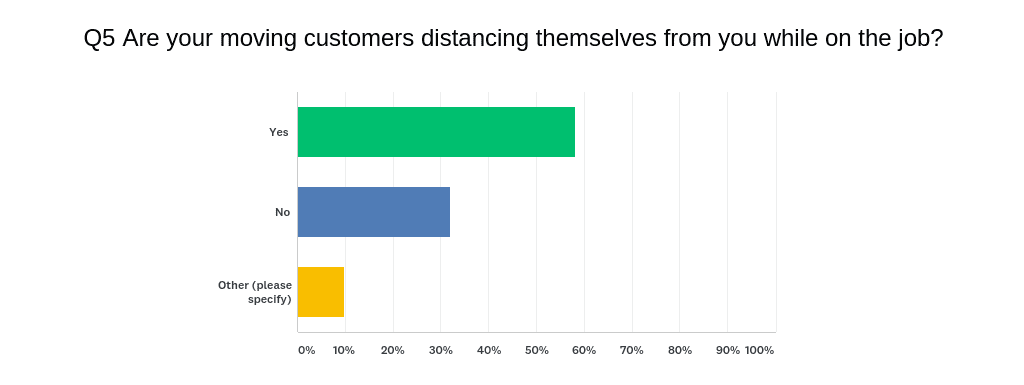
Are your moving customers distancing themselves from you while on the job?
- Yes – 58.08% (194)
- No – 32.04% (107)
- Other – 9.88% (33)
“(It’s) difficult to navigate both (the) moves and satisfying the clients needs while properly distancing oneself,” tells us one mover from Arizona, “(We) still have to…touch their household goods.”
And the fear of infection goes both ways. “I have a fear that I am going to be exposed to it and get my family sick without knowing I’ve done so,” tells us one mover from Nevada. Another says, “(It’s) scary touching people’s items whom you don’t know.” Both parties are in a precarious situation.
It’s worth noting that some movers are reporting extra precautions leading to slowdowns on the overall service of some moves. “It’s getting to the point where my guys and I are kinda contained either in the back of the truck or in the house, so it’s really slowed down the pace of moves. (There’s) a lot of panic moves and date changes,” tells us one moving company from Ohio.
Answers to “other” include movers who report customers sometimes distancing themselves and sometimes not, movers who have no jobs to report on, and movers who are unsure about the best practices for social distancing.
Masks, gloves, and safety supplies
What safety precautions are movers taking?
Many movers are reporting wearing masks and gloves on their moves. The CDC recommends cloth masks and disposable gloves if you need to be in public, saving filtered masks for healthcare professionals, when possible.
Some movers are being extra diligent beyond protective gear, as one crew leader from Idaho explains to us regarding his safety methods. “We have had to bring one person in the house and two outside the house to limit the number of new people in their home. We usually have the person who is O-blood type (the most virus-resistant person) inside the house.” One preliminary study showed a difference in susceptibility to COVID-19 by blood type.
Most moving companies know that gloves are essential and also look good to customers. But getting supplies has not been an easy task for many moving companies, as one moving company from Wisconsin illustrates.
“Supplies to prevent the spreading are hard to find. Workers are afraid to work. Some will use it as an excuse to not work, and that should be their right to do so.”
Not only are gloves, disinfectants and gloves hard to find, but when movers do find them, some are losing money on all these extra items they need in order to keep their safety. “We have to spend (on) additional expenses to make the client comfortable, yet the pricing is staying the same,” explains one moving company from Texas.
Almost half of movers say moving people is “awkward” during COVID-19 outbreak
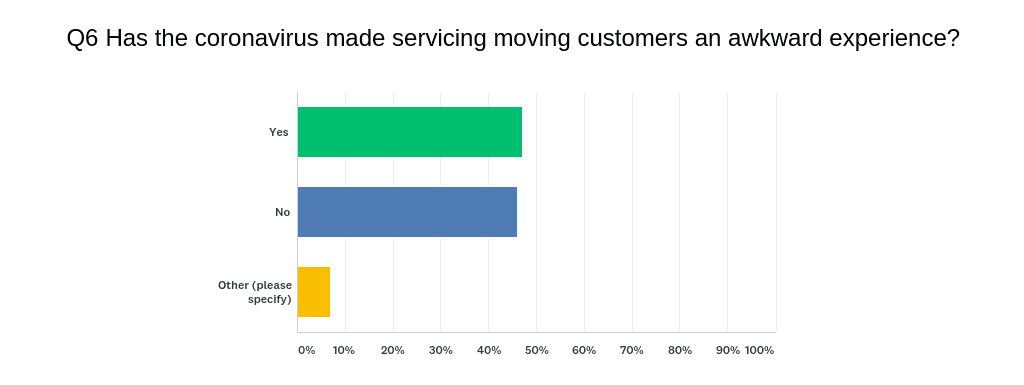
Has the coronavirus made servicing moving customers an awkward experience?
- Yes – 46.99% (156)
- No – 46.08% (153)
- Other – 6.93% (23)
Even with attention to detail paid, provided safety materials, and plenty of due diligence, moving people during uncertain times is hard. Almost half say it’s awkward, in fact.
“Customers are more distant,” reports one mover from New York. “Moving items tends to create dust particles in the air. A sneeze is seen as another reason for our customers to distance.”
While uncertainty is the likely culprit for people moving being unsure how to act, almost half of movers report practicing things like elbow-touching as a greeting and strong leadership as their means for relieving tensions with their customers.
However, strange behaviors can also extend towards how desperate some people are to not avoid movers, but to hire them, as illustrated by this story from a mover in California, “I told one lady that if (The Department of Transportation) issues a restriction for our operations, we may have to cancel her move. She got really mad and said if we cancel, she will sue the hell out of us because she has too many things that depend on her move!”
Movers in large states concerned about Coronavirus
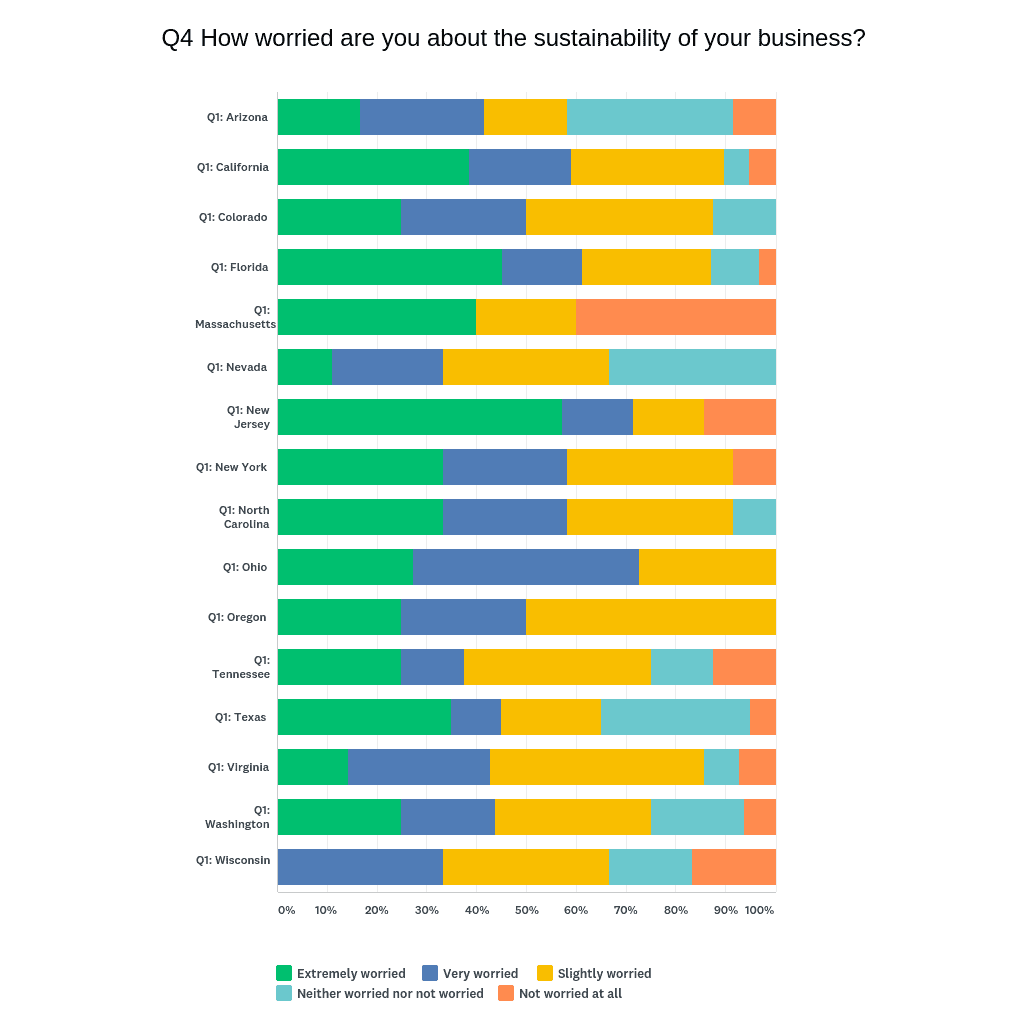
While sample sizing is limited in some states, it’s worth noting that our sample of states with large metropolitan areas such as California and New York show a strong amount of concern. This roughly correlates with states that have high levels of job cancellations, although concern, in general, is still high regardless of cancellations.
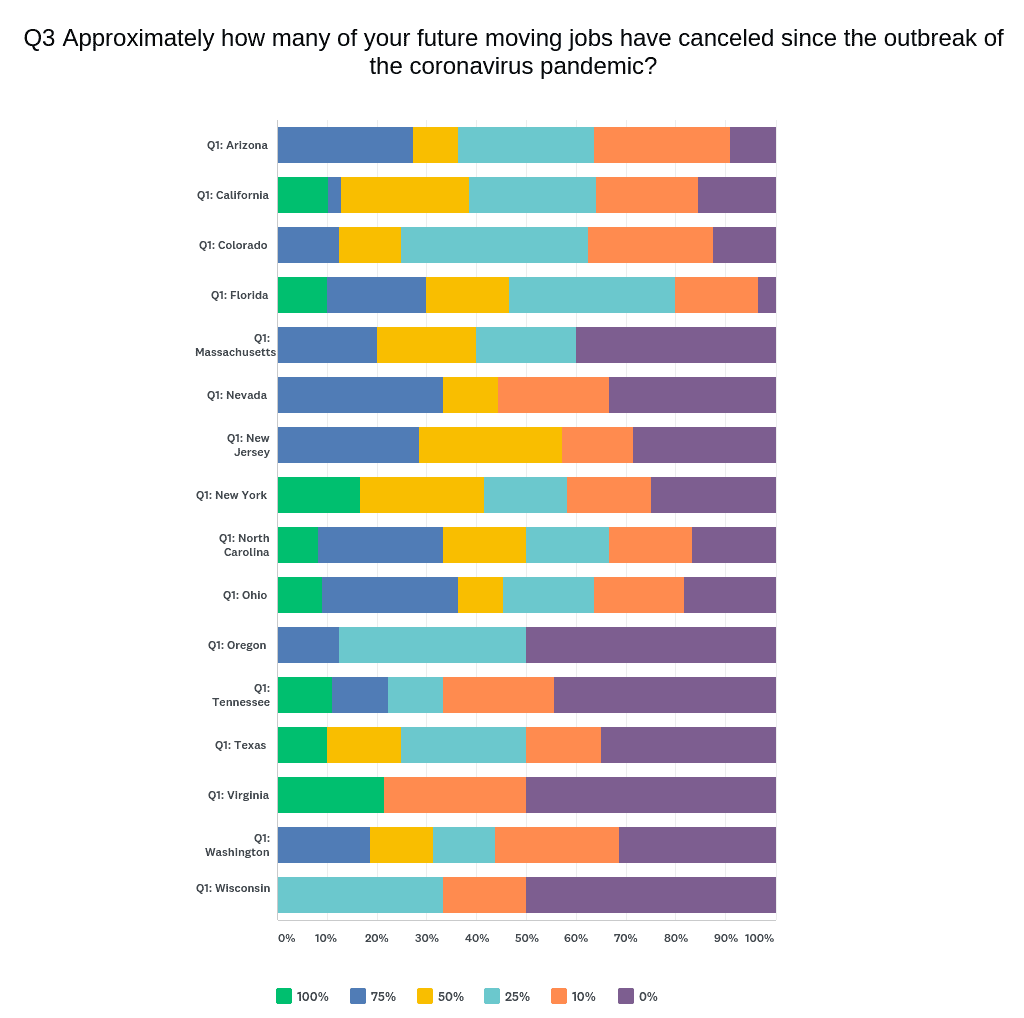
This might suggest that as restrictions on day-to-day life increase, so will the impact on small businesses such as moving companies, just as they have in larger states.
What should movers do?
Until federal-wide aid for individuals and small businesses are enacted, including nation-wide solutions to rent, evictions, small businesses, and group home policies, among others, moving labor will continue to be a needed service. (State-wide solutions by definition do not address interstate moves.)
All of this, despite the safety concerns posed by relocating during a pandemic.
While they are still in operation, moving companies and their clients should do everything in their power to follow CDC recommendations for workplaces, including these things:
- Maintain six feet of distance between people at all times
- Wear protective gloves and even gowns, if possible
- Open windows and doors to create circulation
- Avoiding stirring up dust when possible
- Do not shake dirty laundry
- Use diluted, unexpired, household bleach solutions on surfaces you will frequently use
- Wash your hands frequently for 20 seconds at a time
Local moving companies should also consider utilizing a federal relief loan program for small business owners. Their website is here.
And ultimately, if either a professional mover or a person needing moving is known to be exposed to COVID-19, they should not seek to relocate, regardless of any external factors.
To read HireAHelper’s overall statement on COVID-19, click here.




